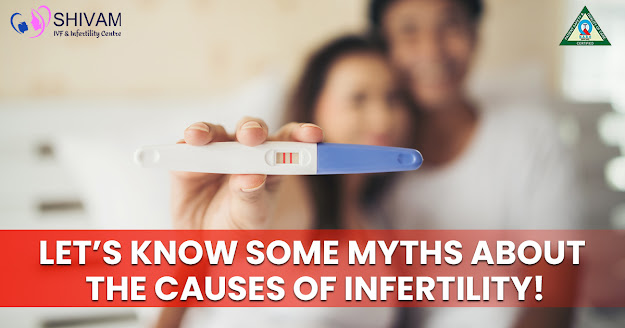Let’s Know Some Myths About The Causes Of Infertility!!
There are
many untrue beliefs about getting pregnant and infertility. You've probably
heard a lot of them from well-intentioned family members and friends who want
to cheer you up. But it's crucial to distinguish fact from fiction when trying
to conceive because holding onto some of these myths could prevent you from
receiving the care and fertility treatments you require.
1.
Stress leads to infertility
"Just
relax and it will happen," people frequently tell infertile women. But
it's not quite that easy. Although stress does not cause infertility, it can
delay ovulation by suppressing hormones. On the other hand, couples who are
trying to conceive may experience stress, anxiety, and depression as a result
of infertility.
2.
Women
with "regular" periods are the only ones with normal fertility
The Office
of Cooperative Reproductive Health at the University of Utah discovered that
only 13% of cycles are 28 days long. There is a lot of variation in the average
cycle length, which is indicated by the distribution of cycle length, which
resembles a bell curve and is centered around the 28-day mark.
3.
The majority of women experience
infertility
Nearly
half of the men who experience infertility do not seek medical attention.—one
in ten men. Men who consumed diets low in folic acid and vitamin E had a higher
rate of chromosomal abnormalities in their sperm, according to researchers at
the University of California, Berkeley. And whether a male or female factor causes
infertility men can frequently experience severe emotional suffering due to
infertility. Consult IVF Doctor in Delhi.
4.
A couple who adopts is more likely
to become pregnant
According
to the National Infertility Association, this is one of the most upsetting
myths that couples can encounter. First of all, it implies that adoption is
only a means to an end rather than [a] contented and fruitful end in and of
itself. Second, it is untrue in every way. According to studies, infertile
couples who adopt have a similar success rate of conceiving as infertile
couples who do not adopt.
5.
The pill does not affect fertility
Your cycle
may not normalize for three to six months after you stop taking the pill. Even
after all of the medication has left your system, it may take several months
for your hormones to return to normal because the pill suppresses the natural
hormones that are in charge of ovulation.
6.
Only issues with reproduction can
lead to infertility
Genetic
abnormalities, certain acute and chronic diseases, exposure to certain
environmental toxins, smoking, and alcohol use are among the causes of
infertility, according to the CDC (more than one drink per day).
CONCLUDING:
With
individualized care and cutting-edge technology, Shivam IVF, the best infertility treatment facility in
Delhi NCR, aims to deliver top-notch fertility treatment. If you've been
looking for a thorough infertility program, we are your best option because we
can assist you in starting a family. We want to brighten the faces of the women
who long to experience motherhood.




Comments
Post a Comment